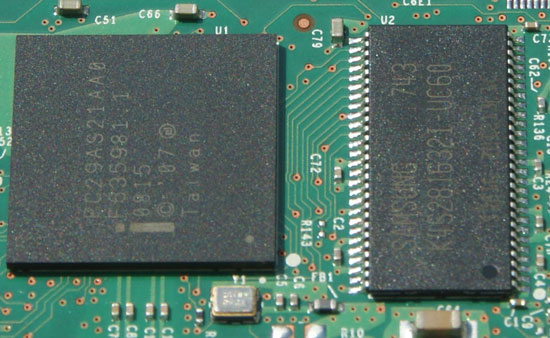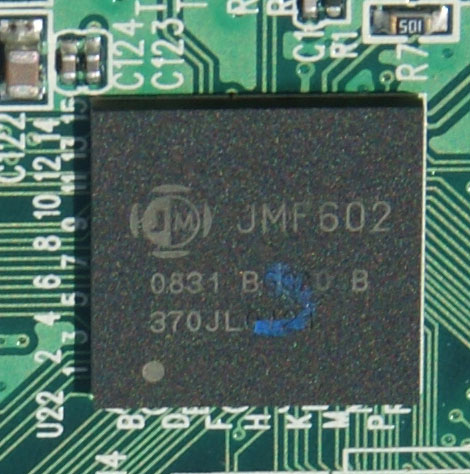Intel X25-M SSD: Intel Delivers One of the World's Fastest Drives
by Anand Lal Shimpi on September 8, 2008 4:00 PM EST- Posted in
- Storage
A Lack of DRAM or a Lack of Cache?
The high latency random write issue is annoying enough that it'd force me not to recommend any of the non-Intel MLC drives on the market today, regardless of how attractive their pricing may be. High performance with caveats isn't exactly high performance to me.

Intel's controller (left) + DRAM (right)
That being said, the root of the problem is still unknown. My first thought was that it was because the MLC drives had no DRAM buffer, and if you'll notice, Intel's MLC drive does have a DRAM buffer. I asked Intel about this and it turns out that the DRAM on the Intel drive isn't used for user data because of the risk of data loss, instead it is used as memory by the Intel SATA/flash controller for deciding exactly where to write data (I'm assuming for the wear leveling/reliability algorithms). Despite the presence of the external DRAM, both the Intel controller and the JMicron rely on internal buffers to cache accesses to the SSD.

Finding good data on the JMicron JMF602 controller is nearly impossible, but from what I've heard it's got 16KB of on-chip memory for read/write requests. By comparison, Intel's controller has a 256KB SRAM on-die. And I'm going to go out on a limb and assume that given Intel's experience with CPU caches, that its SRAM implementation is probably very well done.
With the JMicron based solutions, if you try and write too much to the drive (and trust me, it won’t take a lot) and the buffers get full, the controller tells the system that it’s not ready to write more data and you get a pause.
When you cause the JM602’s internal buffer to overflow, your system runs in bullet-time. Applications take much longer to launch and close, windows take longer to appear, and there are distinct pauses in anything you want to do that involves the disk. Want to send an IM? Well, that writes to an IM log - you can expect a pause before you can send your IM. Loading webpages is the worst, reading from and writing to the cache wreaks havoc on these cacheless MLC drives. Just for kicks I tried loading AnandTech while I was extracting a 5GB file on the SuperTalent 60GB MLC, it took over 10 seconds for the website to load. Once the JM602 was free to fulfill the read request, the website just popped up - but until then it was like my DNS was failing. It’s a lot like what happens to your notebook if you try and do too much, the disk quickly becomes a bottleneck.
Thankfully, as we've already seen, this problem is only limited to JMF602 based MLC drives. The SLC drives and the Intel MLC are totally fine, so while I'll include these problematic MLC drives in today's comparison, let me state now that I would not purchase one.
JMicron's roadmap shows a new controller next year with an integrated ARM core as well as support for external DRAM, which could alleviate these problems, but until now the controller, and drives based on it, aren't worth it. You get a much better overall experience out of a conventional mechanical disk drive, and much better performance from the Intel SSD or any of the SLC solutions on the market.
The Test
| CPU: | Intel Core 2 Quad Q9450 (2.66GHz) |
| Motherboard: | Intel DG45ID |
| Chipset: | Intel G45 |
| Chipset Drivers: | Intel 8.1.1.1010 (Intel) |
| Memory: | Corsair XMS2-8500 1066 |
| Video Card: | VisionTek Radeon HD 4850 |
| OS: | Windows Vista Ultimate 32-bit |










96 Comments
View All Comments
Anand Lal Shimpi - Tuesday, September 9, 2008 - link
I think the question was: how much more performance is left untapped by current controller designs? The JMicron issues are a limited case, what will truly be telling is what happens when we see Intel vs. Samsung with SLC drives...The dominating the charts line was in reference to the Crysis results. If you've ever run the Crysis GPU bench you'll know that it is extremely disk intensive (particularly the first run). As I mentioned in the article, it over emphasizes the importance of disk performance but that's not to say that the results aren't valid.
I do see your point however, let me see what I can do about clarifying that statement.
-A
yyrkoon - Tuesday, September 9, 2008 - link
Ok, I guess I missed the JMicron 'thing', but to be perfectly honest I dislike *anything* JMicron and try to avoid them whenever possible. I guess I am just so interested in these Intel drives, I just tuned everyting else out. However, I did read what you mentioned about 'trouble-shooting' the JMicron MLC issue.Never ran Crysis, and do not plan on running it anytime soon if ever, but I am somewhat of a hardcore gamer.
Keep up the good work, and PLEASE do keep us informed on at least these Intel SSD drives :)
BD2003 - Monday, September 8, 2008 - link
If the achilles heel of the JMicron MLC is the random write speed, why couldnt a ram buffer be used to cache writes? Sure this would cause a serious problem if the power went out, but thats an issue some would be willing to live with.I'm fairly sure vista has an option for this in the device manager in the properties tab of a drive - "enable advanced disk performance". I wonder if that would have any effect on the results?
DigitalFreak - Monday, September 8, 2008 - link
Yet more proof that JMicron products are shit.ggordonliddy - Monday, September 8, 2008 - link
For the love of all humanity: If you are going to write for a living, please learn basic comma usage!It is NOT okay to just stick a comma in the middle of a sentence anytime you want. And it gives readers a headache.
Here is just one of numerous examples of improper comma usage I've seen so far (and I've only gotten to the 3rd page!):
"Intel certifies its drives in accordance with the JEDEC specs from 0 - 70C, at optimal temperatures your data will last even longer [...]"
The comma before "at optimal" should be replaced with a semicolon or a period (I prefer the semicolon).
Did you actually pass your English classes? I'm guessing that you probably did and you are just a product of our miserable public school system that refuses to hold students to any real level of accountability.
(And BTW, your quoting system is broken. When I enter text in the Quote Text dialog and click OK, nothing new appears in the Comment compose field.)
7Enigma - Friday, September 19, 2008 - link
Honestly man, you need to seriously relax. My personal rule of thumb for grammar is does the mistake make the understanding of the sentence difficult to comprehend.Writing something like, "Intel certifies its drives in accordance with the JEDEC specs from 0 - 70C, at optimal temperatures your data will last even longer [...]", while not grammatically correct is completely readable.
If it was something like, ""Intel certifies drives to accordance with the JEDEC specs from 0 - 70C, at optimal data your temperatures will last even longer [...]", now you have a legitimate beef.
The former can easily be forgiven, the latter makes my head hurt when I read it. Trust me, whatever you do, do not go to Dailytech.com and read the articles. Those even I get annoyed at frequently and I'm very forgiving.
Anand Lal Shimpi - Tuesday, September 9, 2008 - link
You're quite right, thanks for the heads up :) Some of the article was directly from my notes while I was working on the tests, so that's one source of unpolished bits. I know I'm far from perfect, so I do appreciate your (and anyone else's) assistance.Thanks :)
Anand
pkp - Tuesday, September 9, 2008 - link
Thanks for posting, Anand. I see you're already aware of the problem, but I wanted to throw my two cents in.What is the usual editing process? I think a once over by a second set of eyes would have caught the bulk of the grammatical errors.
Of course, the ultimate issue isn't commas. It's readability. However, the problem was bad enough that I'm making this comment without having even gotten through the first page of this article.
JarredWalton - Tuesday, September 9, 2008 - link
I'm often the content editor for posted articles, but often we skip that stage due to late nights and schedules. Doing a final thorough edit can require a couple hours (edit and then HTLM-ize), and when someone finishes an article at 5AM or whatever and it's an NDA type piece, delaying it any further is usually not desired by the readers or us.I do read all posted articles, and often I take the time to go through and fix any noteworthy errors. A few misplaced commas don't really detract from a 5000 word article, however, and depending on what else is going on I may or may not edit the text. If anyone takes the time to point out specific errors, i.e. "on page 3 you write "...." they always get corrected - at least if I see it. General complaints are much more difficult to address though, i.e. "You used passive voice and therefore you must DIE!" LOL.
I know personally that when you write a long article with lots of testing, certain thoughts tend to appear in multiple places and the final result isn't always as coherent as I would like. Trying to "fix" problems relating to flow and readability is difficult at best, and requires more time than we generally spend. If anyone wants to make specific suggestions, though, we're open for input as always.
Perhaps it's useful to compare the process to print publications. Magazines usually have several editors on staff whose job is solely to edit other authors' work; I can say that we don't have anyone at AnandTech in that position these days. (I edit some of the articles, but not all, and even then I make mistakes.) That's probably why we have more typos than magazines, but then we provide far more thorough coverage as well. Last I saw, most magazine hardware reviews end up being one page and ~1000 words, with a couple charts.
At the end of the day, I get most of my detailed information from the internet. Magazines might be more grammatically correct, and they make for great toilet reading, but I don't generally depend on them as a source of credible information. I'd say it's safe to say we won't see such an in-depth exploration of SSD performance and issues in any magazine. [Now I have to prepare to have someone point me to an article in some magazine that does exactly that.]
Cheers,
Jarred
KikassAssassin - Tuesday, September 9, 2008 - link
Then I guess I should point you to an article in last month's issue of my favorite data storage magazine.http://www.solidstatedisksmonthly.com/2008/08/ever...">http://www.solidstatedisksmonthly.com/2...erforman...
Unfortunately, their website seems to be down at the moment, but keep checking it, I'm sure it'll be back up soon (and don't be fooled by the article's title. It's actually only 23 pages without the ads).